Search the Special Collections and Archives Portal
Search Results
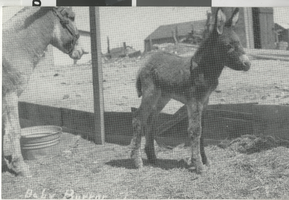
Postcard of a baby burro, Tonopah (Nev.), 1905
Date
1905
Archival Collection
Description
There was an inscription on the image. "The burro was the principal form of transportation used by prospectors in central Nevada at the turn of the century. The prospectors had a love-hate relationship with the animals, which were dependable and well adapted to the desert region, although they could be stubborn and cunning. As the automobile became the accepted mode of transportation, the burros were turned loose and roamed the streets and local trash dumps of the area's towns. They were one of the principal forms of entertainment for local children until they gradually disappeared from the metropolitan areas in the 1920s. The burros that roam Death Valley and the Marietta area of central Nevada today are descendants of those left behind by the prospectors."
Image
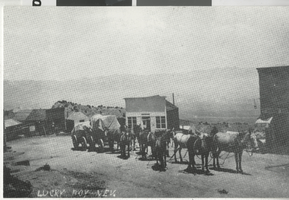
Postcard of Lucky Boy (Nev.), 1909
Date
1909
Archival Collection
Description
The town of Lucky Boy was born as a result of the discovery of lead-silver ore in the vicinity in 1906. The camp experienced a boom in 1908 when exploration opened a number of rich veins in the district. Lucky Boy's population peaked in the 1910 at over 800, then declined rapidly as the high grade was mined out. The mines produced ore on a small scale through the 1950s.
Image
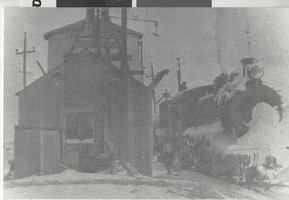
Postcard of a Tonopah and Goldfield Railroad train, Millers (Nev.), 1933
Date
1933
Archival Collection
Description
A Tonopah and Goldfield Railroad train takes on water and fuel at Millers, NV, winter, 1933. "The winter of '33 was one of the most severe recorded in central Nevada up to that time. Snow isolated many outlying communities for weeks at a time and temperatures dropped to the -30s. On a number of occasions the trains were marooned in the snow drifts between Millers, Tonopah and Goldfield and had to be dug out by hand."
Image
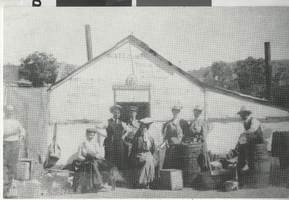
Postcard of a tent store, Montezuma (Nev.), 1908
Date
1908
Archival Collection
Description
Montezuma was the site of extensive mining activity from the 1860s-1880s but was dormant in the early 1900s when the Goldfield strike was made. According to the information painted on the front of the "Road House" of the "Montezuma Trading Company", the traveler or prospector could purchase "Wines & Liquors, Tobacco, Miners Supplies, Hay & Grain, and Groceries" at the store. Montezuma was located in the Montezuma Mountains seven miles west of Goldfield and was experiencing a resurgence precipitated by the discoveries at Goldfield.
Image
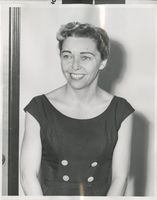
Photograph of Flora Dungan, early 1950s
Date
1950 to 1954
Archival Collection
Description
Black and white portrait of Flora Dungan.
Image
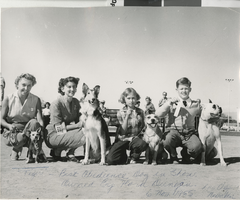
Photograph of Flora Dungan at a dog show in Las Vegas (Nev.), November 6, 1955
Date
1955-11-06
Archival Collection
Description
Image of Flora Dungan with her dog Tiger and several unidentified individuals. "'Tiger' - Best Obedience Dog in Show. Owned by Flora Dungan. 6 Nov 1955 Las Veg. Nevada."
Image
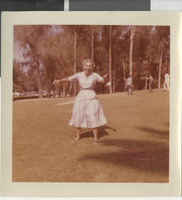
Photograph of Flora Dungan, September 27, 1958
Date
1958-09-27
Archival Collection
Description
An image of Flora Dungan twirling a hula hoop.
Image
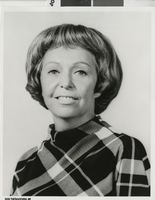
Photograph of Flora Dungan, 1960s
Date
1960 to 1969
Archival Collection
Description
Black and white portrait of Flora Dungan.
Image
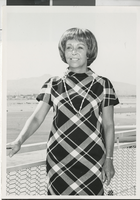
Photograph of Flora Dungan, 1960s
Date
1960 to 1969
Archival Collection
Description
Black and white portrait of Flora Dungan.
Image
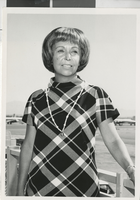
Photograph of Flora Dungan, 1960s
Date
1960 to 1969
Archival Collection
Description
Black and white portrait of Flora Dungan.
Image
Pagination
Refine my results
Content Type
Creator or Contributor
Subject
Archival Collection
Digital Project
Resource Type
Year
Material Type
Place
Language
Records Classification
